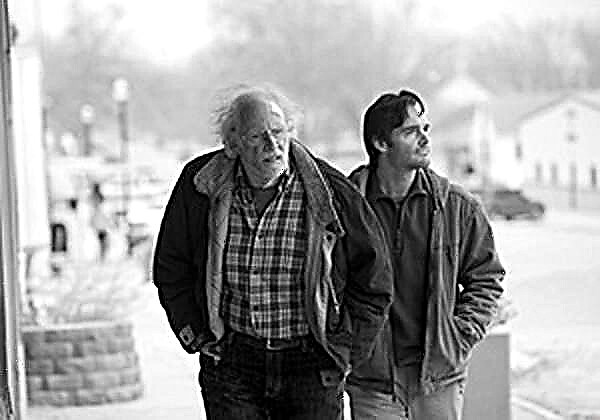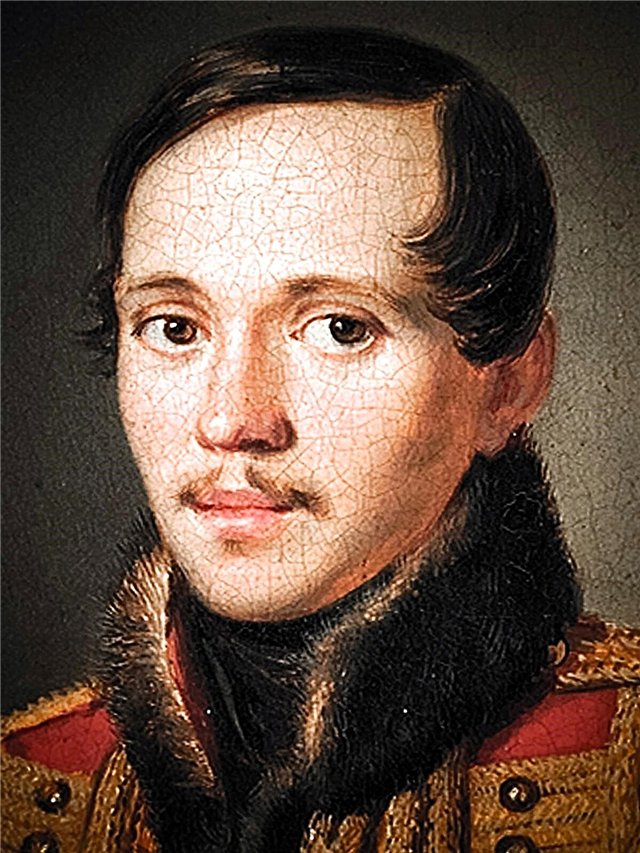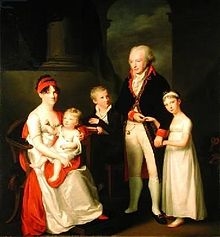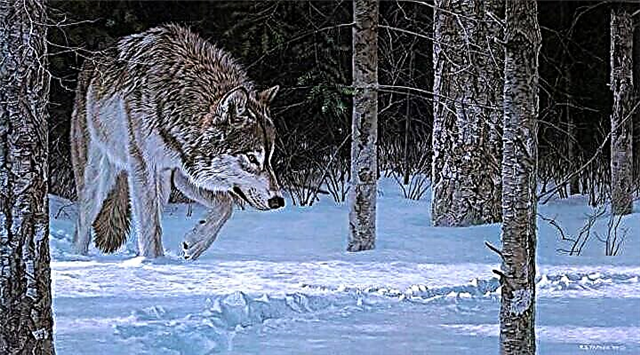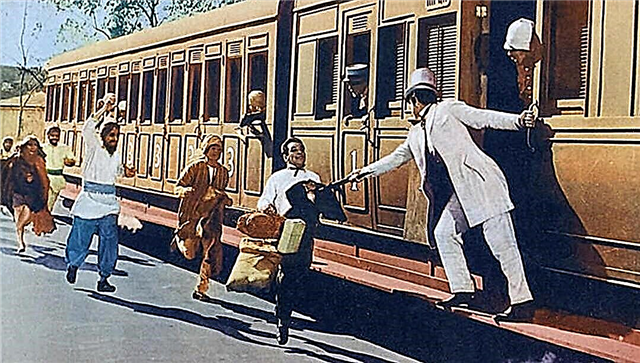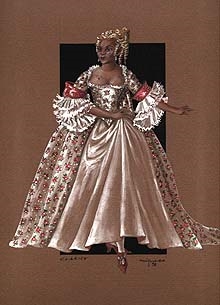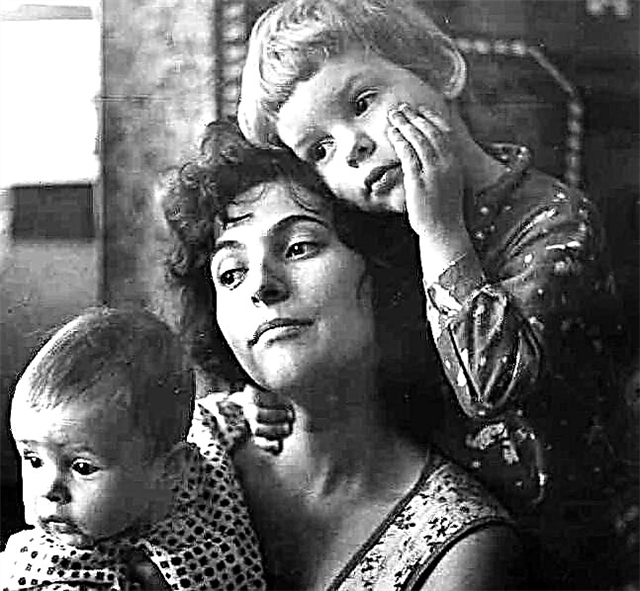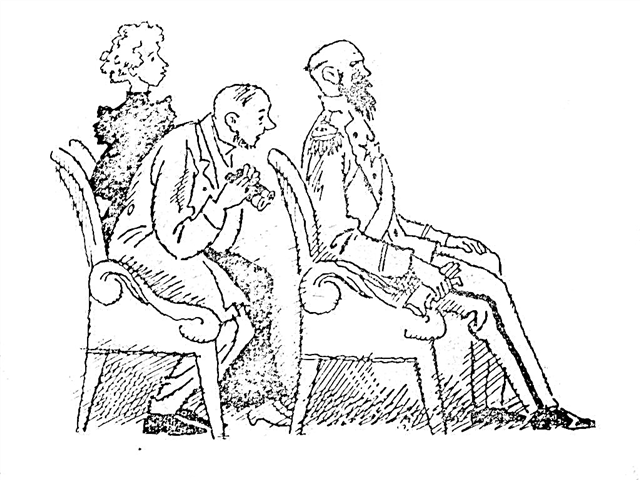: The old Romanian recalls her stormy youth and tells two legends: about the son of an eagle, doomed to eternal loneliness for pride, and about a young man who sacrificed himself to save his native tribe.
The titles of the chapters are conditional.
Chapter 1. The Legend of Larre
The narrator met the old woman Isergil when he was picking grapes in Bessarabia. One evening, resting on the seashore, he talked to her. Suddenly the old woman pointed to a shadow from a low-floating cloud, called it Larra and told “one of the glorious tales composed in the steppes”.
Many thousands of years ago, a tribe of hunters and farmers lived in the "country of the big river." Once one of the girls of this tribe was carried away by a huge eagle. They searched for the girl for a long time, did not find and forgot about her, and twenty years later she returned with her adult son, whom she gave birth to from an eagle. The eagle itself, sensing the approach of old age, committed suicide - fell from great heights to sharp rocks.
The son of an eagle was a handsome guy with cold, proud eyes. He did not respect anyone, but with the elders he kept himself as equals. The elders did not want to accept the guy into their tribe, but that only made him laugh.
He went to the beautiful girl and hugged her, but she pushed him away, because she was the daughter of one of the elders and was afraid of the anger of her father. Then the son of an eagle killed the girl. He was tied up and began to come up with a "punishment worthy of a crime."
One wise man asked why he had killed the girl, and the eagle's son replied that he wanted her, and she pushed him away. After a long conversation, the elders realized that the guy "considers himself the first on earth and, except for himself, does not see anything." He did not want to love anyone and wanted to take what he wanted.
For everything that a person takes, he pays for himself: with his mind and strength, sometimes with his life.
The elders realized that the son of an eagle dooms himself to terrible loneliness, decided that this would become the most severe punishment for him, and released him.
The son of an eagle was called Larra - an outcast. Since then, he lived "free as a bird", came to the tribe and abducted cattle and women. They shot him, but couldn’t kill him, because Larra’s body was covered by “the invisible cover of the highest punishment”.
So Larra lived for many decades. Once he approached people and did not defend himself. People realized that Larra wanted to die, and retreated, not wanting to alleviate his fate. He stabbed himself in the chest with a knife, but the knife broke, he tried to smash his head on the ground, but the earth moved away from him, and people realized that Larra could not die. Since then he has been wandering the steppe in the form of an ethereal shadow, punished for his great pride.
Chapter 2. Memoirs of the old woman Isergil
The old woman Isergil dozed off, and the narrator sat on the shore, listening to the sound of the waves and the distant songs of the grape harvesters.
Waking up suddenly, the old woman Isergil began to remember those whom she loved in her long life.
She lived with her mother in Romania on the banks of the river, wove carpets. At fifteen, she fell in love with a young fisherman. He persuaded Isergil to leave with him, but by then the fisherman was already tired of her - "only sing and kiss, nothing more."
Throwing a fisherman, Isergil fell in love with a gutsul - a cheerful, red-haired Carpathian young man from a robber gang. The fisherman could not forget Isergil and also stuck to the Hutsuls. So they were hanged together - both a fisherman and a gutsula, and Isergil went to look at the execution.
Then Isergil met an important and wealthy Turk, lived in his harem for a week, then missed her and fled with his son, a dark-haired, flexible boy much younger than her, to Bulgaria. There, a grinder stabbed her in the chest with a knife, either for her groom or for her husband - Izergil no longer remembers.
Out Yzergil in a convent. The Polish nun who was caring for her had a brother in a nearby monastery.With him, Isergil fled to Poland, and a young Turk died from an excess of carnal love and homesickness.
The Pole was "funny and mean", he could use his words to hit him with a whip. Once he strongly offended Isergil. She took him in her arms, threw him into the river and left.
I have never met after those whom I once loved. These are bad meetings, all the same as if with the dead.
People in Poland turned out to be “cold and deceitful,” Isergil found it difficult to live among them. In the city of Bochnia, she was bought by one Jew, "not for myself, but to trade." Isergil agreed, wanting to make money and return home. “Rich pans” went to feast on her, showered her with gold.
Isergil loved many, and most of all the handsome nobleman Arkadek. He was young, and Isergil had already lived four dozen years. Then Isergil broke up with the Jew and lived in Krakow, was rich - a big house, servants. Arkadek long sought her, and having achieved - threw it. Then he went to fight with the Russians and was captured.
Izergil, pretending to be a beggar, killed the sentry and managed to rescue her beloved Arkadek from Russian captivity. He promised to love her, but Isergil did not stay with him - did not want to be loved out of gratitude.
After this, Isergil left for Bessarabia and remained there. Her Moldovan husband has died, and now the old woman lives among young pickers of grapes, tells them her tales.
A thundercloud came from the sea, and blue sparks began to appear in the steppe. Seeing them, Isergil told the storyteller the legend of Danko.
Chapter 3. The Legend of Danko
In the old days, between the steppe and impassable forest lived a tribe of strong and courageous people. Once stronger tribes appeared from the steppe and drove these people into the depths of the forest, where the air was poisoned by the poisonous fumes of the swamps.
People began to get sick and die. It was necessary to leave the forest, but there were strong enemies behind, and marshes and giant trees blocking the road ahead, creating a “ring of strong darkness” around people.
People could not return to the steppe and fight to the death, because they had covenants that were not supposed to disappear.
Nothing - neither work, nor women exhaust the bodies and souls of people in the same way as dreary thoughts exhaust.
Serious thoughts created fear in the hearts of people. The cowardly words that one must return to the steppe and become slaves of the strongest sounded louder.
And then the young handsome Danko volunteered to withdraw the tribe from the forest. People believed and followed him. Their path was difficult, people perished in the swamps and every step was given to them with difficulty. Soon, the exhausted tribesmen began to grumble at Danko.
Once a thunderstorm began, impenetrable darkness fell on the forest, and the tribe lost heart. People were ashamed to admit their own powerlessness, and they began to reproach Danko for the inability to control them.
Tired and angry people began to judge Danko, but he replied that the tribesmen themselves were not able to save their strength on a long journey and simply walked like a flock of sheep. Then people wanted to kill Danko, and in their faces there was no longer either kindness or nobility. Out of pity for the fellow tribesmen, Danko's heart flashed with fire of desire to help them, and the rays of this mighty fire sparkled in his eyes.
Seeing Danko’s eyes burning, people decided that he was furious, alert, and began to surround him in order to seize and kill him. Danko understood their intention and became bitter, and his heart flared up even brighter. He “tore his chest with his hands”, tore out a flaming heart, raised it high above his head and led the charmed people forward, illuminating their path.
Finally, the forest parted and the tribe saw the wide steppe, and Danko laughed joyfully and died. His heart was still burning near his body. Some cautious man saw this and, frightened by something, “stepped on his proud heart with his foot”. It crumbled into sparks and died out.
Sometimes blue sparks appear in the steppe before a thunderstorm. These are the remains of Danko's burning heart.
After finishing the story, the old woman Isergil dozed off, and the narrator looked at her withered body and wondered how many more “beautiful and strong legends” she knew.Having covered the old woman with tattered rags, the narrator lay down beside him and stared at the cloudy sky for a long time, and the sea was “dull and sad” nearby.

